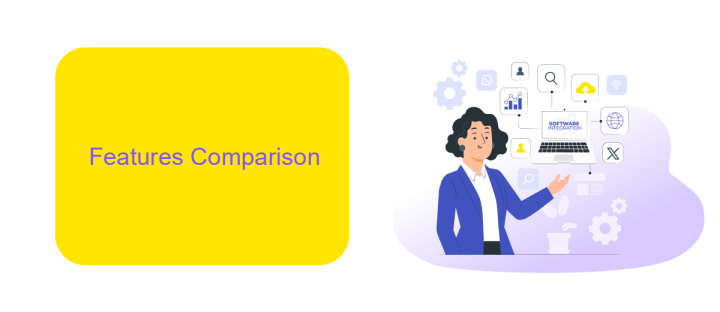Zapier Vs Cloudpipes
When it comes to automating workflows and integrating various applications, Zapier and Cloudpipes are two prominent tools in the market. Both offer unique features and capabilities that can enhance productivity and streamline processes. This article delves into a comparative analysis of Zapier vs. Cloudpipes, exploring their strengths, weaknesses, and the scenarios where each tool excels.
Introduction
When it comes to automating workflows and integrating various services, two popular platforms often come to mind: Zapier and Cloudpipes. Both tools aim to simplify the process of connecting different applications and automating repetitive tasks, but they have their own unique features and benefits. Choosing the right platform depends on your specific needs and the complexity of your workflows.
- Zapier: Known for its user-friendly interface and extensive library of app integrations.
- Cloudpipes: Offers advanced features and more complex workflow capabilities.
- ApiX-Drive: Another notable service that provides seamless integration and automation solutions.
In this article, we will delve into the key differences between Zapier and Cloudpipes, examining their strengths and weaknesses. We will also explore how ApiX-Drive can serve as a valuable alternative for those seeking efficient and reliable integration solutions. By the end, you'll have a clearer understanding of which platform best suits your business needs.
Features Comparison

Zapier and Cloudpipes are both powerful tools for automating workflows, but they offer different features that cater to various user needs. Zapier excels in its user-friendly interface and extensive library of over 3,000 integrations, making it accessible for users with no coding experience. It supports multi-step workflows, conditional logic, and offers a variety of pre-built templates to get users started quickly. Additionally, Zapier's powerful search functionality helps users find the right app connections effortlessly.
On the other hand, Cloudpipes stands out with its advanced data transformation capabilities and support for complex business processes. It offers more granular control over data manipulation and supports custom scripting for tailored automation solutions. Cloudpipes also provides robust error handling and detailed logging, which are essential for maintaining workflow reliability. For businesses looking for a more customizable and detailed approach to automation, Cloudpipes may be the preferred choice. Both platforms, however, can be complemented by ApiX-Drive, a service that simplifies integration setup and management, ensuring seamless connectivity between various apps and services.
Use Cases

Both Zapier and Cloudpipes are powerful tools for automating workflows and integrating various applications. However, their use cases can vary based on the specific needs of businesses and individuals.
- Zapier: Ideal for small to medium-sized businesses looking for a user-friendly interface to connect popular apps like Google Sheets, Slack, and Mailchimp.
- Cloudpipes: Suited for enterprises needing advanced integration capabilities with complex systems, including ERP and CRM solutions.
- ApiX-Drive: Perfect for those who require a seamless and quick setup to integrate a wide range of applications without any coding knowledge.
While Zapier excels in simplicity and ease of use, Cloudpipes offers more robust features for intricate workflows. ApiX-Drive stands out by providing an efficient way to configure integrations swiftly, making it an excellent choice for businesses aiming to streamline their processes effortlessly.
Pricing and Plans

When comparing Zapier and Cloudpipes, pricing and plans are crucial factors to consider. Both platforms offer a range of options to cater to different business needs, but they differ in their approach and cost structures.
Zapier operates on a freemium model, providing a free tier with limited features and several paid plans that scale based on usage and advanced functionalities. Cloudpipes, on the other hand, offers a more enterprise-focused pricing model, which can be more suitable for larger organizations with complex integration needs.
- Zapier Free Plan: Basic features, limited tasks per month.
- Zapier Starter Plan: Enhanced features, more tasks, starting at .99/month.
- Zapier Professional Plan: Advanced features, premium support, starting at /month.
- Cloudpipes Basic Plan: Comprehensive features, starting at 0/month.
- Cloudpipes Enterprise Plan: Customizable solutions, pricing upon request.
For businesses looking to streamline their integration processes without breaking the bank, ApiX-Drive offers an affordable alternative. ApiX-Drive provides user-friendly tools to set up and manage integrations efficiently, making it a viable option for small to medium-sized enterprises.
Conclusion
In the comparison of Zapier and Cloudpipes, it becomes evident that both platforms offer robust solutions for automating workflows and integrating various applications. Zapier stands out with its user-friendly interface and extensive library of app integrations, making it an excellent choice for businesses of all sizes looking to streamline their processes with minimal technical effort. On the other hand, Cloudpipes provides more advanced features and customization options, which can be particularly beneficial for enterprises with complex automation needs.
However, it's worth considering alternatives like ApiX-Drive, which also excels in providing seamless integrations and automation capabilities. ApiX-Drive offers a wide range of supported applications and an intuitive setup process, making it a strong contender in the integration platform market. Ultimately, the choice between Zapier, Cloudpipes, and ApiX-Drive will depend on your specific requirements, such as the complexity of your workflows, the level of customization needed, and your budget constraints. Each platform has its unique strengths, and selecting the right one will significantly enhance your business efficiency and productivity.
- Automate the work of an online store or landing
- Empower through integration
- Don't spend money on programmers and integrators
- Save time by automating routine tasks
FAQ
What are the primary differences between Zapier and Cloudpipes?
Which platform is better for small businesses?
Can both Zapier and Cloudpipes handle complex workflows?
Are there any alternatives to Zapier and Cloudpipes for automation and integration?
Do these platforms offer support and resources for users?
Apix-Drive will help optimize business processes, save you from a lot of routine tasks and unnecessary costs for automation, attracting additional specialists. Try setting up a free test connection with ApiX-Drive and see for yourself. Now you have to think about where to invest the freed time and money!


